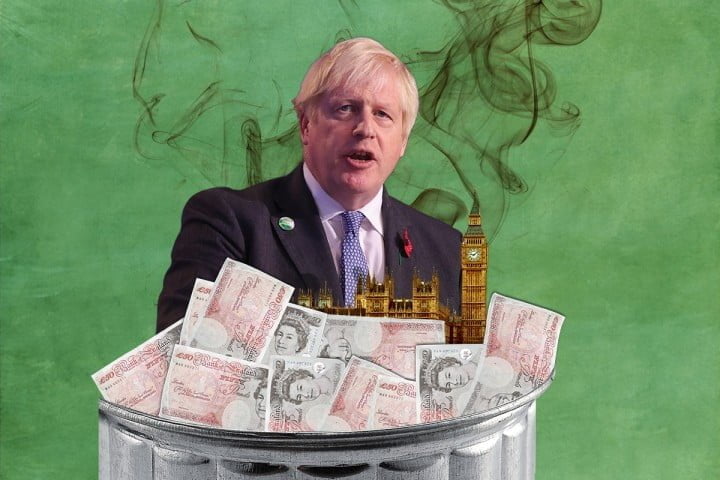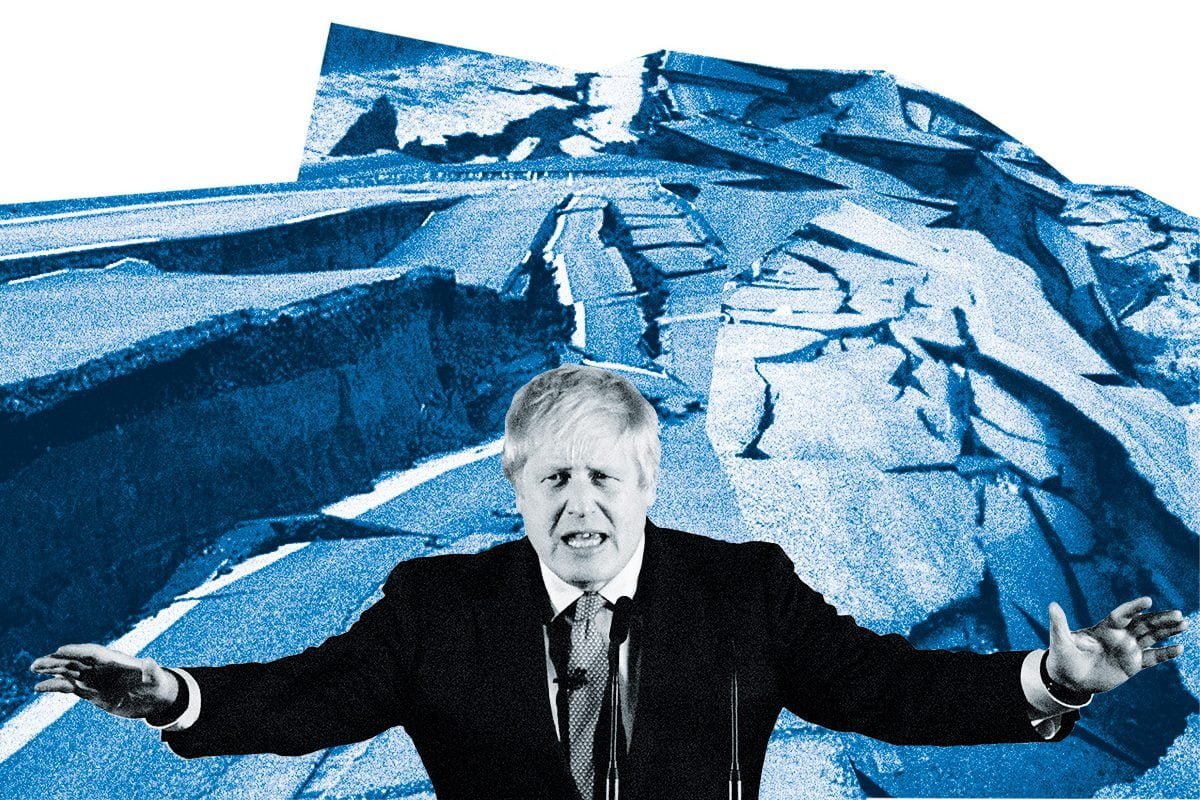After months of crises and scandals, faced with a growing rebellion in his ranks, Boris Johnson has finally fallen on his sword. But the Tory leader’s departure will not solve any problems for the ruling class. Instead, explosive events impend.
Labour Prime Minister Harold Wilson once famously remarked that a week is a long time in politics. Given the current pace of events in crisis-ridden Britain, however, it seems that political developments can now be measured in hours.
Marx made a similar – but more profound – observation when he stated that there were periods of calm and quiet when decades passed as if they were only days; and other periods of storm and stress, in which the experience of decades was concentrated in the space of just days.
Britain, not long ago considered one of the most stable capitalist countries, is now clearly living through the latter. We have entered a new epoch: one of sharp turns and sudden changes.
From the referendums over Scottish independence and Brexit, to the rise of the Corbyn movement and the never-ending chaos in the Tory Party: the country’s political landscape has been rocked and shaken by one earthquake after another.
The resignation of Boris Johnson, however, far from putting an end to this instability and turbulence, is set to intensify it. A new chapter is opening up in the crisis of British capitalism.
Tory meltdown

Following a torrent of sleaze and scandal in recent months, from the Patterson debacle to the saga of partygate, the dam finally began to burst on Tuesday this week.
The resignation of two prominent cabinet members – Rishi Sunak and Sajid Javid, formerly the chancellor and health secretary, respectively – triggered an avalanche of departures from Johnson’s frontbench, leading to meltdown within the Tory Party.
Ministers were quitting at record-breaking speeds. Only two days after being appointed as education secretary and chancellor, for example, Tory MPs Michelle Donelan and Nadhim Zahawi, respectively, were stepping down and calling on the Prime Minister to go.
By yesterday evening, even staunch loyalists such as home-secretary-headbanger Priti Patel were putting pressure on Johnson to resign. Conservative grandee Michael Gove was even fired by the PM for his insubordination.
Sinking ship

The nominal catalyst for this mass rebellion was the (aptly-named) Pincher affair, after revelations unfolded that Johnson had feigned ignorance regarding the gross misconduct of one of his parliamentary whips.
In truth, however, it is clear that MPs were merely looking for an excuse – a casus belli – to launch their palace coup, following the party’s humiliating defeat in the Tiverton and Wakefield by-elections, and having failed to oust their rancid leader in last month’s vote of confidence.
Ever-oblivious to reality, Johnson seemed determined to cling on throughout. Even last night, with his cabinet abandoning him, like rats off a sinking ship, Boris was suggesting that he would go down fighting.
But this morning, the disgraced Prime Minister finally admitted defeat. The caveat, however, is that he intends to stay on as ‘caretaker’ PM until the autumn, whilst a new Tory leader is elected.
In a sign of how little currency his promises are worth though, and fearing the damage their lame duck leader could inflict in the meantime, his own MPs are demanding a more immediate transition of power.
In any case, with Conservative MPs boycotting Johnson’s cabinet, refusing to take on any ministerial positions lest they be tainted and tarnished by association, the government is effectively paralysed.
Deafening chorus

The contest to succeed Boris now begins. Some contenders, such as attorney general Suella Braverman, have already thrown their hat into the ring. And a long list of other high-profile figures are set to join her.
Likely leadership hopefuls include foreign secretary Liz Truss, newly-appointed chancellor Nadhim Zahawi, and defence secretary Ben Wallace. Sunak and Javid are also rumoured to be lining up a bid for the top job, as are potential darkhorse-candidates Penny Mordaunt and Tom Tugendhat.
All of these reprobates, rogues, and reactionaries will attempt to square a circle: portraying themselves as a ‘safe pair of hands’, offering a break with the chaos of the Boris-era, whilst simultaneously appealing to the rabid ranks of the Tories – those who ultimately get to decide who next leads their party.
In doing so, this gang of degenerates will fall over themselves to prove how tough they will be: against the unions; against Brussels; against Scotland; against Putin; against the ‘woke brigade’; and against refugees and migrants.
The so-called ‘moderate’ voices, in turn, will be drowned out by a deafening chorus of jingoism, libertarianism, and racism.
Those in the establishment hoping for a reset, a return to ‘normality’, meanwhile, will soon realise that the Tory Party has a new normal – one in which the ‘sensible’ people have been locked up in the Tower of London, whilst the clowns, crooks, and charlatans take over the court.
Civil war
The party itself, meanwhile, will be consumed by an open civil war. For all his recklessness and egotism, Johnson was – initially, at least – a unifying figure. But with him gone, all hell will break loose, with rival factions lining up behind their champions as they tear chunks out of each other.
At the beginning, Boris united all the various wings of the Tories behind him: new northern ‘Red Wall’ MPs, and those from traditional, southern strongholds and shires; Thatcherites wanting lower taxes and ‘fiscal discipline’, and a fresh generation demanding ‘levelling up’ and state spending on infrastructure and public services.
Now, the only thing uniting these heterogeneous ladies and gentlemen is their unanimous hatred for the former Tory leader.
The Conservative Party is therefore set to be torn to pieces by its own internal contradictions and centrifugal forces. And that is before a tsunami of ‘stagflation’, strikes, and social upheaval batters them from pillar to post.
Government of crisis

In such conditions, the ruling class may begin to seriously consider the idea of an early general election, with the hope of bringing in a capitalist coalition made up of ‘Sir’ Keir Starmer’s Labour and the resurgent Lib Dems, who are likely to gain at the Tories’ expense in rural and suburban seats.
Such a government would be a government of crisis from day one, however, with inflation predicted to reach 11% this autumn, as the energy price cap is lifted further, and with the UK economy heading into a new recession.
Upon entering Number 10, therefore, PM Starmer would immediately be greeted with knocks on the door from workers demanding a proper pay rise, and from ordinary households demanding emergency measures to tackle the ever-worsening cost-of-living catastrophe.
At the same time, the Labour leader has made it clear whose side he is on: opposing strikes; supporting western imperialism; and outflanking the Tories when it comes to flag-waving and fawning over big business.
A Starmer government, in short, would be at the service of the ruling class. And within the confines of capitalism, it would be unable to offer any real solution to the problems facing the working class. Instead, after the briefest of honeymoons – if any – it would by carrying out more austerity and attacks, meaning more explosive struggles on the industrial front and on the streets.
Forces of Marxism

Workers and youth must therefore organise and mobilise to campaign for a general election from their own class position, in order to kick out all the Tories: not just to overthrow this decrepit government, but to overthrow the entire rotten system that they represent.
Now more than ever, in this respect, the trade unions must coordinate action and unite all their battles into a deluge of militant struggle, linked to the fight for socialism.
We have entered into uncharted waters. British capitalism is sailing into a perfect storm. Only the ideas of Marxism can provide a compass through this maelstrom.
Join us today, therefore, to help us in the most urgent and pressing of tasks: to build the forces of Marxism, in Britain and internationally, and prepare for the revolutionary events that impend. There has never been a greater cause.






